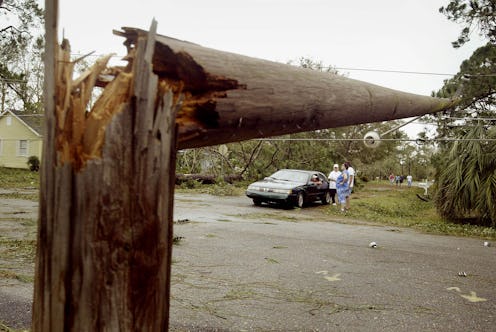News
Warm Winter Weather Creates Havoc In The South
Unseasonably warm winter weather took over the East Coast over the last week, turning Christmas into a wet and balmy day that seemed more fit for spring than late December. These warm temperatures brought flooding and tornadoes to Alabama on Friday, just days after severe storms that raged across the southeastern part of the United States left at least 15 people dead. These bizarre weather patterns are expected to continue over the weekend, causing multiple governors to declare a state of emergency and leaving the rest of us to face the downside of this unusually warm December weather.
According to ABC News, Alabama received the brunt of Friday's severe weather when a tornado touched down near Birmingham. More than 7 inches of rain reportedly fell in the northwest region of the state, with other areas receiving up to 6 inches of rain. Two Alabama counties received more than 8 inches of rainfall, Al.com reported. The U.S. National Weather Service in Huntsville, Alabama, also reported that a record daily rainfall was set in Huntsville on Friday — 5.34 inches of rain.
As of Saturday morning, Alabama Gov. Robert Bentley said nearly 200 roads remained closed throughout the state. Bentley said in a statement Friday:
Many parts of Alabama have experienced excessive rainfall and flooding is a major concern,” Governor Robert Bentley said. “By issuing a State of Emergency, I have directed all state agencies to take necessary actions to be prepared to respond to the anticipated flooding across Alabama. We will actively monitor the flooding, and are prepared to respond to any requests for assistance.
The Alabama EMA warned that roads and bridges may be impassable due to the flooding. Alabama EMA Director Art Faulkner added in a statement:
AEMA encourages residents to continue to monitor rains and be prepared to take action from fast rising water in flood prone areas. We will work with local officials to make sure the needs of our citizens are being met and assess the affected areas for damage.
Late on Friday, the National Weather Service rated two rivers in the state with "major" flooding. Two other Alabama rivers were rated "moderate," while a handful of other rivers had "minor" flooding. As of Saturday morning, the National Weather Service upgraded the Elk River near Fayetteville, Alabama, to "moderate" flooding.
While there are no confirmed fatalities from Friday's flooding and tornado, local news station WSFA reported that a 22-year-old man and a 5-year-old child were swept away by a flash flood in Jack, Alabama. Authorities are searching for the missing pair.
The tornado that struck Birmingham reportedly flattened houses, damaged numerous structures and littered debris throughout the street. First responders spent most of Christmas day searching for residents trapped under the wreckage.
The havoc in Alabama comes just two days after a deadly tornado touched down in Mississippi, causing Gov. Phil Bryant to declare a state of emergency in seven counties. A powerful storm that swept through Tennessee on Christmas Eve also left six people dead, according to state officials.
Meteorologists attribute this erratic bout of severe weather to the warm and humid weather patterns, which have been setting temperature-high records up and down the East Coast. You don't have to freak out about global warming just yet, however — or, at least in this bizarre case of flip flops and tank tops on Christmas Day. Meteorologist Matt Lanza told FiveThirtyEight that El Niño and the polar vortex are most likely responsible for these warm winter temperatures.
"While El Niño is certainly going to take home most of the accolades this winter, you’re going to see numerous records for warmth get broken...this month," Lanza told FiveThirtyEight. "When attribution studies are performed on this warm pattern (likely in the coming months), it is likely that they’ll conclude that it would have been exceptionally warm without the effects of climate change."
So, keep calm and enjoy that cold beer on your back porch in the dead of winter in the Northeast.
